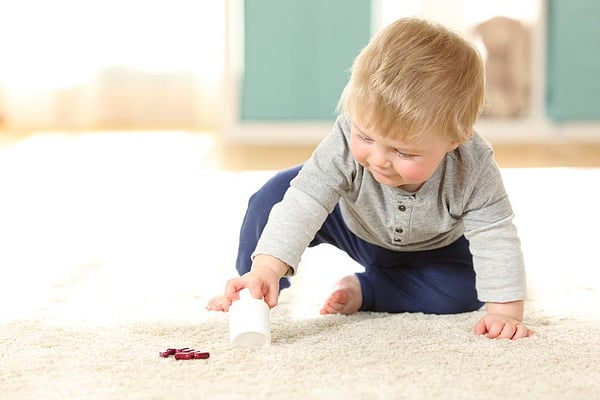Children’s Medicine Safety

Anyone can make mistakes taking medication, but kids are especially vulnerable. According to the American Academy of Pediatrics, half of all kids don't take their medicines properly.
Of course, no one should expect a 6-year-old to read and follow the instructions on a box of cough syrup or pain reliever. It's up to parents and other caregivers to make sure kids take the right medicines in the right way. Anyone caring for younger children must also take steps to prevent accidental poisonings from medicines or supplements. Medications can help keep children healthy and comfortable, but one misstep can be tragic. Here's what you can do to make sure your child isn't harmed by medications.
Taking medicines safely
To make sure your kids get the right medicine, here are some guidelines from federal health agencies and Safe Kids Worldwide, an international non-profit organization dedicated to preventing childhood injuries:
- Ask your doctor to carefully explain the instructions for taking each prescription medicine. If these instructions seem confusing or if they don't match the directions on the label, call your doctor or pharmacist.
- When giving your child over-the-counter medicine, read the label carefully, paying special attention to the dose. If the label doesn't list a dose for your child's age, talk to your doctor before giving the medicine to your child.
- Keep your child informed. If your child is old enough, tell him everything you can about his medicine. Read the instructions aloud to him, tell him why he needs it, and discuss the possible dangers, including side effects.
- Some drugs don't mix well together. For instance, if your child takes an antacid for an upset stomach, it might interfere with the antibiotic he takes for an ear infection. Read labels carefully to look for potential conflicts. You should also keep a list of every medicine your child takes, including over-the-counter drugs. Share this list with all of your child's healthcare providers.
- Don't give your child herbal products unless your doctor okays them.
- Know the potential side effects of each medication and what you should do if they occur. Tell your child to let you know if he feels different after taking the medication.
- Don't give your child medicine prescribed for someone else or share your prescriptions with others.
- When you pick up the medicine at the pharmacy, ask the pharmacist what the drug is for. This simple question can prevent a serious mix-up.
- Throw out drugs if their expiration date has passed.
- Always keep medications in their original containers.
- Even if your child feels much better, she shouldn't stop taking a prescription medication unless your doctor says it's okay. This is especially important if your child is taking antibiotics.
- If you ever have any questions or concerns about your child's medications, don't hesitate to ask your doctor.
Preventing poisonings
From a small child's point of view, there isn't much difference between an open bottle of medicine and a jar of candy. If a toddler can get a hold of a small, brightly colored pill, he won't hesitate to pop it in his mouth. And he just might go back for more.
Iron found in vitamins can be fatal to children in large doses, and is a particular problem. Since iron is present in children's vitamins -- and many brands are chewable and taste like candy -- make sure to keep all your vitamins in a locked cabinet.
If you have little ones around, you should treat medications just as you would any other dangerous chemical. Keep all drugs in a cabinet or other place far away from busy little hands. Remember: Child-resistant packages aren't necessarily childproof. The only safe bottles are the ones your child can't reach.
Here are some other ways to keep kids safe:
- Make sure houseguests don't leave medicines lying around
- Never call medicine candy
- Post the number of your local poison control center by your phone
If you think your child has swallowed a potentially dangerous medication, call a poison control center immediately. The American Association of Poison Control Centers has established a national, toll-free hotline 1-800-222-1222. The number will connect you immediately with a local poison control expert. The expert will need to know your child's age and weight, the type of medication, and the approximate number of pills swallowed. Call 911 immediately if your child shows any of the following signs:
- Difficulty breathing
- Nausea or vomiting
- Stomach cramps without fever
- Severe throat pain
- Unusual drooling or strange breath odors
- Convulsions or unconsciousness
- Sudden, unexplained changes in behavior, such as extreme sleeplessness or irritability
No parent wants to make that call. Keep medicines and all poisons out of reach, and you probably won't have to.
References
American Academy of Pediatrics. Medications--Taking medicine correctly.
U.S. Pharmacopeia. Teaching children about medicines.
National Safe Kids Campaign. Preventing poisonings.
National Safe Kids Campaign. Injury facts: Poisoning.
Institute for Safe Medication Practices. Be an Informed Consumer.
The Self-Care Advisor. Time-Inc. Health.
How To Get the Most From Your Medications. The American Academy of Family Physicians.
Related Posts
Hydrocortisone Does Not Up Survival Without BPD in Preemies
THURSDAY, March 24, 2022 (HealthDay News) -- For extremely preterm infants,...
La segregación escolar se vincula con problemas de alcohol entre los jóvenes negros
LUNES, 18 de abril de 2022 (HealthDay News) -- La segregación escolar podría...
Breastfeeding Can Protect Hearts of Mom, Baby Long Term
FRIDAY, Aug. 26, 2022 (HealthDay News) -- Breastfeeding can deliver long-term...
Could Binge Drinking Set Your Heart Rhythm Off-Kilter?
THURSDAY, Jan. 13, 2022 (HealthDay News) -- Binge drinking on Super Bowl Sunday...
